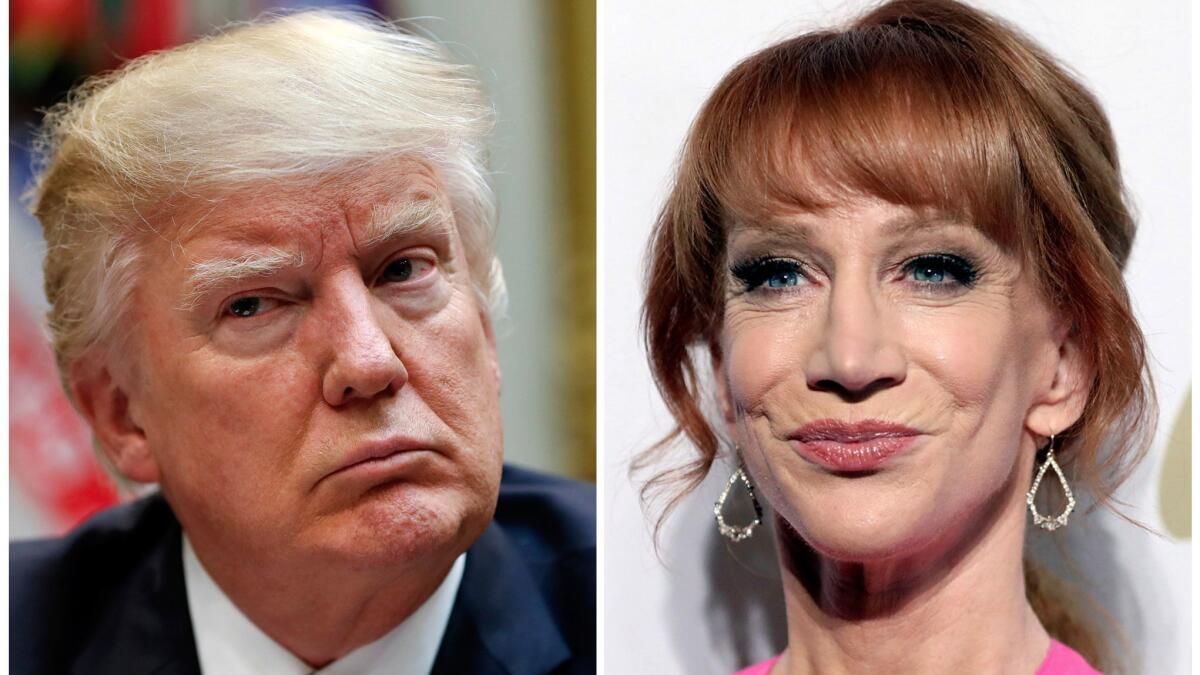Editorial: Trump didn’t birth American intolerance. He’s the manifestation of our long-disturbed national dialogue

A scuffle broke out last week on the floor of the Texas state Legislature. As protesters — many of them Latino — chanted, Republican Rep. Matt Rinaldi told some of his Democratic counterparts that he had summoned Immigration and Customs Enforcement agents to check the protesters’ legal status. That sparked an argument and a shoving match and, apparently, threats of further violence. Reportedly, a Democratic legislator told Rinaldi he would “get” him on his way to his car, and Rinaldi responded: “I’ll put a bullet in your head.”
In an entirely separate incident a few days earlier, Texas Gov. Greg Abbott held up a target he had just riddled with bullets at a gun range and said, “I’m gonna carry this around in case I see any reporters.” Coming the day after a Republican congressional candidate was accused of physically attacking a journalist in Montana, wrestling him to the ground by the neck and punching him, Abbott’s joke rang hollow.
It is becoming more difficult to see these as one-off displays of anger or poor judgment. Comedian Kathy Griffin rightly drew wide condemnation recently over a photo in which she held up something that was supposed to look like the bloody and severed head of President Trump. Controversial speakers now routinely face the heckler’s veto on college campuses — crowds of protesters raising such a ruckus that the speech is drowned out or canceled. After Fox News aired and posted online a video clip of Princeton African American studies professor Keeanga-Yamahtta Taylor describing Trump as a “racist, sexist megalomaniac” in a commencement speech, Trump supporters flooded her with racist and sexist emails, including some that she said were so threatening that she canceled scheduled talks this week in Seattle and at UC San Diego. That echoes previous showdowns — and violent clashes — surrounding scheduled speeches by controversial conservatives at Berkeley and other colleges.
It’s hard not to see these violations of common decency as part of a disturbing coarsening of the nation’s political dialogue.
Many of these protests and verbal attacks are protected by the 1st Amendment (although true incitement to imminent violence is not). But regardless of whether they’re legal, it’s hard not to see these violations of common decency as part of a disturbing coarsening of the nation’s political dialogue. There’s a tendency on the left to lay this at the feet of Trump, but that is facile. Trump has certainly helped make our discourse cruder, and he has engaged in more than his share of objectionable ad hominem attacks and threats, but he follows the culture as much as he leads it. Read the comments on news stories, or the misogynistic missives received by female journalists who challenge the status quo of gender relations. Or just be an African American, or a Muslim, and feel the intolerance.
To be sure, American politics often has had a touch of the street fight to it. In 1856, U.S. Sen. Charles Sumner of Massachusetts was severely beaten on the floor of the Senate by a cane-wielding Southern congressman over anti-slavery comments Sumner had made. A century later, presumably in a lighter vein, President Harry S. Truman wrote a letter to a music critic who panned a singing performance by his daughter, Margaret. “Some day I hope to meet you,” Truman wrote on White House letterhead. “When that happens you’ll need a new nose, a lot of beefsteak for black eyes, and perhaps a supporter below!”
What’s worrisome about the current mood is that it seems so widespread. And it’s unclear where it will end. A newspaper office in Kentucky had its street windows shot out a week ago. While no motive has been established — nor has the gunman been identified — it still marks a disturbing move farther down a violent road. The attack came early on a Sunday morning, and no one inside was injured. In Washington, Evergreen State University has been roiled by race-related protests, including the angry targeting of a white professor who objected to taking part in a “day of absence” recognizing people of color. Next month, two dozen anti-Muslim rallies are being planned around the country.
The drumbeat of hatred, incivility and intolerance threatens our political system in ways big and small. It demeans individuals, disrupts discourse and exacerbates divisions. It weakens our claim to be a culture that values a free and open exchange of ideas. And at worst, it devolves into violence, which is unacceptable.
We must do better. As much as it may pain people at the political extremes to accept, we are all in this together, and the path forward should not be littered in broken glass or stymied by a refusal to communicate.
Follow the Opinion section on Twitter @latimesopinion or Facebook
More to Read
A cure for the common opinion
Get thought-provoking perspectives with our weekly newsletter.
You may occasionally receive promotional content from the Los Angeles Times.










